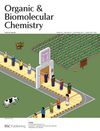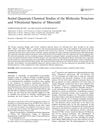 7 citations,
January 2019 in “Pharmaceutical Biology”
7 citations,
January 2019 in “Pharmaceutical Biology” Eclipta prostrata helps hair growth and maintains the growth phase by affecting certain growth factors.
 15 citations,
October 2016 in “Steroids”
15 citations,
October 2016 in “Steroids” Researchers developed a new method to find substances in herbs that can block a specific enzyme linked to hair loss.
 September 2023 in “Translational medicine reports”
September 2023 in “Translational medicine reports” Minoxidil ingestion can raise liver enzyme levels.
 2 citations,
January 2012 in “Hair therapy & transplantation”
2 citations,
January 2012 in “Hair therapy & transplantation” DDAIP-HCl significantly increases minoxidil absorption into the skin.
 5 citations,
March 2016 in “Acute medicine & surgery”
5 citations,
March 2016 in “Acute medicine & surgery” Swallowing a lot of minoxidil, a hair growth liquid, can cause severe and long-lasting low blood pressure.
 33 citations,
June 1995 in “Journal of Pharmaceutical Sciences”
33 citations,
June 1995 in “Journal of Pharmaceutical Sciences” More ethanol increases minoxidil delivery, but too much lowers efficiency.
 19 citations,
July 2020 in “Journal of drug delivery science and technology”
19 citations,
July 2020 in “Journal of drug delivery science and technology” Nanoemulsions with minoxidil and clove oil effectively target hair follicles for better alopecia treatment.
 13 citations,
February 2018 in “Bio-medical Materials and Engineering”
13 citations,
February 2018 in “Bio-medical Materials and Engineering” Minoxidil inside tiny particles can deliver more drug to hair follicles, potentially improving treatment for hair loss.
 8 citations,
January 2011 in “Organic and Biomolecular Chemistry”
8 citations,
January 2011 in “Organic and Biomolecular Chemistry” Minoxidil reacts to nitrosation 7 times more than phenol, mainly due to its -NH₂ groups, leading to the creation of N-nitrosominoxidil.
 6 citations,
August 2014 in “Spectroscopy Letters”
6 citations,
August 2014 in “Spectroscopy Letters” The analysis shows where minoxidil's atoms are likely to react and describes its electronic transitions and behavior with temperature changes.










